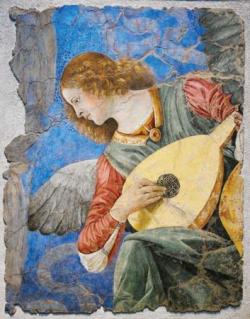In the Infinite Now
The night is glossy
living encased in
black-marble
silence.
The night is a
stone cutter
chiseling gloom
into strange
light.
The night is a
voyage we take
into otherness
with our feet
upon the
mortal land.
The night is
drunk on itself
and it lives,
enshrined,
in a vast and
miniscule
Now.
It venerates lovers
who decree:
I will love
who I love
through all
my dream-lives,
through the
angelic sorrow
attached to me
like the jelled,
summer air,
through the
lifespan of the
glacial moon,
through heartbeats
so fast they
could be
humming ghosts,
high frequency
and untamed,
and finally
beyond some
abandoned grief,
almost shining
like a
frosted rose.
In this splinter
of no-time,
in the
soft-burning
eyes of God,
there are no
insignificant
beings,
just this singular
everything,
just this
unutterable love
like a fever of stars:
countless spirits,
one Light.
Patricia Joan Jones

Love is patient, love is
Love is patient, love is kind.
Biblical and cosmic in it's scale, what a pen you weild.
Not often do the words of poetry soothe my aches, but I must say I agree with starward's eloquent praise. As visceral as watching the night sky with a friend.
Thank you kindly, sublime
Thank you kindly, sublime poet. Your gorgeous and precise reflections poured light through the cracks of a difficult day. Your support means so much.
I have said before, and will
I have said before, and will continue to do so, that the posting of a new poem by Patricia is an event; a significant event; a colossal event. This poem is no exception to that trend. I truly believe---and I have no ulterior motive to say, and nothing to gain by saying so---that she is not only the greatest Poet that I have ever encountered at postpoems, but that her work sets benchmarl's (like Vergil's. Stevens', Eliot's). Studying these poets in my undergrad years, I often wondered what it would have been like to see their poems or books appearing one by one. In my undergrad years, however, I would not have been mature enough to appreciate the experience of watching greatness unfold in my sight; now, decades later, I am able to witness it and declare it.
In its remarkable litany of metaphor, this poem reminds me of the work of two powerful Poets, Pop Stevens, and the French_diplomat (Ambassador to the United States, 1928-1933)---both of whom used metaphor heavily in their poetry. Patricia's poem presents a catalogue of night metaphors---a nocturne, if I might be permitted the pun---and one can almost hear the delicate piano notes of Chopin's Nocturnes---in the background.
In the final three stanzas of the poem, we arrive at its center of gravity, about which all the other metaphors orbit. And we also see a very subtle shift when she reaches the "unutterable love": she shifts from using metaphor to using simile, which is an entirely different kind of comparison. The Apostle Saint John described the nature of God, God is Love. No Poet, not even one of Patricia's stature, can improve upon that; so simile becomes the best strategy here.
She also reminds us that there are no insigificances in God's eyes; even each hydrogen atom in the entire universe is significant, and known to, God. Again from Saint John: For God so loved the world; and that which is loved cannot never be insiginifant to the Lover. And when I check the word for "world," I find that the word Saint John used was "Cosmos." Not just this planet; not just Jupiter; not just Alpha Centauri; but also the farthest known stars, Icarus and Earendel. And all the microbes that have fossilized in the pits of empty Martian lakes.
Patricia has the great talent of being able to explain a cosmic process in terms of the cosmosc, first and foremost, but in metaphors and similes than the language conveys. This is one of the most difficult tasks facing most Poets. She, however, presents it so successfully that it almost seems that she invented the concept.
Starward*Led
Your comments, as radiant and
Your comments, as radiant and artistic as your poetry, are appreciated more than you know.
"A nocturne". I had to smile when I read that.
I'm wildly gratified that you accurately defined the effect and the message I was going for. You always get it and you always express it with the astute and masterful precision of an aficionado of poetry as well as a great poet.
Deepest, endless gratitude. God bless.
Your poetry demonstrates the
Your poetry demonstrates the paradox of starlight: produced in a process and venue of the most striking grandeur, and yet, when appearing in the sky (the most natural of nocturnes), it is as delicate as a twinkle, and can appear as small as a snowflake. When I was an undergraduate, I came to the conclusion that of the writers of New Testament Scripture, the Apostle Saint John was a real poet. I was also surprised to learn that many first year Greek students learn to read his Gospel first. I found this, also, to be a paradox: the profoundest Gospel (as most commentators would agree) provides the easiest reading experience for someone new to the language? The answer is that John's Greek is so ordinary and so common that it creates almost no barriers to the student learning Greek. But from simplest terms---light and darkness, joy and sorrow, etc.,---John creares the profoundest poetic statements. You, Patricia, are a Poet after the school of Saint John.
Starward*Led
I can't thank you enough for
I can't thank you enough for the honor of a second visit gleaming with intricate insights and an extremely valuable endorsement.
You're an inspiration, fine Poet and messenger of Light.